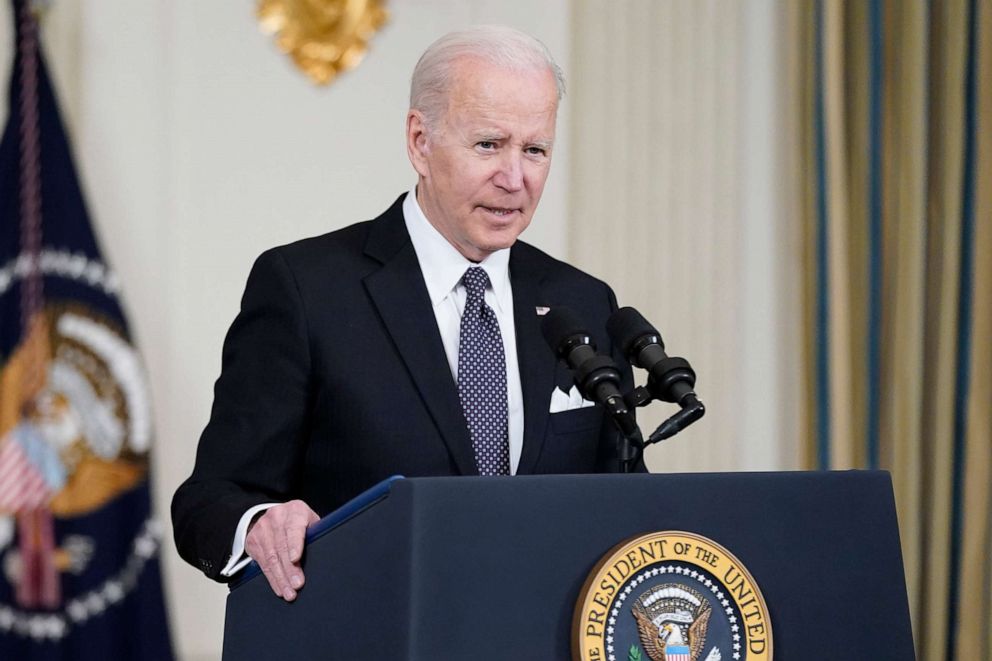Politicized decisions still loom around Jan. 6: The Note
The Jan. 6 committee is wrestling with how far to extend the investigation.
The TAKE with Rick Klein
President Joe Biden almost made it sound easy when he declined to comment on the latest revelations about Ginni Thomas’ efforts to urge officials to try to overturn the election, saying he would leave such matters to the Jan. 6 committee and the Justice Department: "That’s their judgment, not mine, to make."
But recent events only serve to underscore the stakes around decisions not yet made -- or at least not yet revealed publicly -- by both of those entities.
The House Jan. 6 committee is still wrestling with how and whether to seek information from Thomas, the wife of Supreme Court Justice Clarence Thomas, in a probe that has already threatened to grow to unwieldy proportions.
The committee is still gathering new information -- Jared Kushner is slated to appear this week -- with a tight timeline for public hearings and writing a final report. Thomas is only the latest potential witness to prompt dissent inside the committee over how far to extend aspects of the investigation.

And a win for the committee in court on Monday, forcing attorney John Eastman to hand over emails, means more documents, along with a good measure more pressure on the Justice Department.
Judge David Carter crossed an important threshold with his finding that it is "more likely than not that President Trump" committed a crime on Jan. 6. Such a sentence would matter orders of magnitude more, however, if the Justice Department agrees.
Attorney General Merrick Garland has been preparing all along for lengthy investigations, including in his department’s budget request this week for an additional 131 new attorneys to handle Jan. 6-related inquiries.
Biden can take himself out of making the critical decisions. That, though, doesn’t take the politics out of some of the most significant choices that will have to come out of both Congress and law-enforcement entities.
The RUNDOWN with Averi Harper
The Biden administration is pushing a $5.8 trillion budget proposal with aims to drive down the deficit and tackle inflation.
White House officials have described the plan as "fiscally responsible" and say it would decrease the deficit by $1.3 trillion over one year.
That claim is an important one, considering the timing for the Biden administration. It is considered an appeal to the middle as time ticks toward midterm elections that could have unsavory outcomes for Democrats.
To avoid a repeat of the failure of Biden’s Build Back Better spending plan, Biden needs to get Sen. Joe Manchin on board, and playing up a deficit reduction could help him do it.

The plan calls for increases in funding for law enforcement to combat crime and for national security spending amid the ongoing conflict in Ukraine, items that could garner bipartisan support.
Other top lines from the plan include funding for mental health care, veterans services and cancer prevention. On inflation, the plan calls for investments to address supply chain issues, including port infrastructure and shoring up railways that carry freight. It also aims to invest in affordable housing.
White House officials told reporters Monday that deficit reduction efforts, in addition to investments, would address inflation long-term, but they didn’t guarantee short-term relief for the soaring costs Americans are enduring coast to coast.
"We believe the policies in this budget will further reduce the deficit by another trillion over the next decade," Cecilia Rouse, chair of the Council of Economic Advisers, said. "A lower deficit will help ease long-term inflationary pressures and make our fiscal trajectory more sustainable."
Office of Management and Budget Director Shalanda Young is slated to testify to the House Budget Committee on Tuesday about the president’s proposed budget.
The TIP with Alisa Wiersema
Although the date of the upcoming special election in Texas' 34th congressional district is yet to be determined, the race is already shaping up as an opportunity for the GOP to spotlight the party's efforts to forge inroads with Latino voters and diversify its field of candidates.
The contest to replace outgoing Democratic Rep. Filemon Vela will happen within the district's old borders, rather than its new redistricted parameters, offering Republicans hope that they can claim the district, if even for a short time before November's general election. The older district outlined an area that President Joe Biden won by about four points, but according to FiveThirtyEight's redistricting analysis, the new contours of the district -- which this fall's contest will encompass -- resulted in an area that favors Democrats by 17 points.

Earlier this year, the current Republican candidate in the running for the 34th district, Mayra Flores, offered testimony during a redistricting hearing that pushed back on the redistricting changes being imposed under her own party's proposals. At the time, Flores said the changes created by the new map prevented her from significantly challenging a Democratic opponent, while also ignoring the impact Latino conservatives could have on the political landscape.
As reported by ABC News' Brittany Shepherd, Rep. Elise Stefanik backed Flores and acknowledged the possible benefits of competing under the older map while speaking at a Monday press conference to announce the latest round of endorsements for her political action committee, which seeks to elevate conservative women candidates.
"In the Texas' 34th [congressional district] seat as its currently configured … Joe Biden only won this district by four points. Given how under water he is today, at historically low polling, given the multiple crises that voters are facing, whether its inflation, energy prices or the border crises that we see first-hand in Texas, we think we have a ripe opportunity to pick up this seat," Stefanik said.
NUMBER OF THE DAY, powered by FiveThirtyEight
11. People were 11 percentage points less likely to say they would accept a Muslim refugee than a Christian one in a huge study of public opinion in Europe. Recent polls have found support for taking in refugees fleeing Ukraine in the wake of Russia’s invasion is high across Europe -- much higher than the last time Europe faced a sudden influx of refugees in 2015, when more than a million people from several Middle Eastern and African countries sought asylum fleeing the Syrian civil war. Many factors explain the difference, as FiveThirtyEight’s Laura Bronner reports, but studies have found that race and religion are two of the biggest in determining which refugees are accepted versus turned away.
THE PLAYLIST
ABC News' "Start Here" Podcast. Start Here begins Tuesday morning with the latest on the next round of Russia-Ukraine negotiation talks. ABC's Patrick Reevell joins us from Kyiv. Then, ABC's Katherine Faulders reports on the former Trump aides moving closer to being held in contempt of Congress. And, ABC News contributor Marc Lamont Hill discusses the fallout from Will Smith's confrontation at the Oscars. http://apple.co/2HPocUL
WHAT YOU NEED TO KNOW TODAY
Download the ABC News app and select "The Note" as an item of interest to receive the day's sharpest political analysis.
The Note is a daily ABC News feature that highlights the day's top stories in politics. Please check back tomorrow for the latest.



